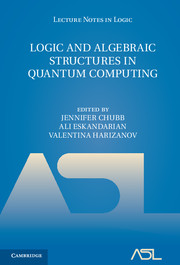Book contents
- Frontmatter
- Contents
- Preface
- Introduction
- 1 A (very) brief tour of quantum mechanics, computation, and category theory
- 2 Could logic be empirical? The Putnam-Kripke debate
- 3 The essence of quantum theory for computers
- 4 Fiber products of measures and quantum foundations
- 5 Operational theories and categorical quantum mechanics
- 6 Relating operator spaces via adjunctions
- 7 Topos-based logic for quantum systems and bi-Heyting algebras
- 8 The logic of quantum mechanics – Take II
- 9 Reasoning about meaning in natural language with compact closed categories and Frobenius algebras
- 10 Knot logic and topological quantum computing with Majorana fermions
- Index
- References
2 - Could logic be empirical? The Putnam-Kripke debate
Published online by Cambridge University Press: 05 June 2016
- Frontmatter
- Contents
- Preface
- Introduction
- 1 A (very) brief tour of quantum mechanics, computation, and category theory
- 2 Could logic be empirical? The Putnam-Kripke debate
- 3 The essence of quantum theory for computers
- 4 Fiber products of measures and quantum foundations
- 5 Operational theories and categorical quantum mechanics
- 6 Relating operator spaces via adjunctions
- 7 Topos-based logic for quantum systems and bi-Heyting algebras
- 8 The logic of quantum mechanics – Take II
- 9 Reasoning about meaning in natural language with compact closed categories and Frobenius algebras
- 10 Knot logic and topological quantum computing with Majorana fermions
- Index
- References
Summary
Abstract. Not long after Hilary Putnam published “Is Logic Empirical,” Saul Kripke presented a critique of Putnam's argument in a lecture at the University of Pittsburgh. Kripke criticized both the substance of Putnam's version of quantum logic and the idea that one could “adopt” a logic for empirical reasons. This paper reviews the debate between Putnam and Kripke. It suggests the possibility of a “middle way” between Putnam and Kripke: a way in which logic could be broadly a priori but in which empirical considerations could still bear on our views about the logical structure of the world. In particular, considerations drawn from quantum mechanics might provide an example.
Some years ago, Hilary Putnam published a paper called “Is Logic Empirical?” [7] in which he argued that quantum mechanics provides an empirical case for revising our views about logic. (The paper was republished in his collected works as “The Logic of Quantum Mechanics”. Page references will be to the reprinted version.) In 1974, Saul Kripke presented a talk at the University of Pittsburgh called “The Question of Logic,” offering a detailed rebuttal of Putnam's case. As of this writing, almost 40 years later, Kripke's paper still hasn't appeared in print and apart from my 1978 dissertation and a paper I published 28 years later [9], very little has been written on the disagreement between Putnam and Kripke. This is unfortunate; the issues are well worth investigating. In my 2006 paper [9], I adopted the device of writing about Paul Kriske and Prof. Tupman out of deference to the fact that there is no published version of Kripke's talk. Here I'll simply write directly about Putnam and Kripke. If I get Kripke wrong, I hope he'll let us know.
As for the plan of the paper, we begin by reviewing Putnam's arguments; after that we move to Kripke's rebuttal. This will lead to a larger discussion of what logic and the empirical might have to do with one another.
- Type
- Chapter
- Information
- Logic and Algebraic Structures in Quantum Computing , pp. 23 - 41Publisher: Cambridge University PressPrint publication year: 2016
References
- 4
- Cited by

